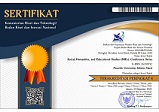Analisis Kemampuan Berpikir Kritis Mahasiswa pada Pembelajaran Berbasis Artificial Intelligence di Era Merdeka Belajar
Abstract
The integration of Artificial Intelligence (AI) in education, particularly in higher education, holds significant potential and influence in enhancing students’ 21st-century skills, especially critical thinking. This study aims to examine the impact of AI-based learning models on students' critical thinking abilities within the framework of Indonesia's Merdeka Belajar policy. Employing a mixed-methods approach, the research combines pre-tests and post-tests, observations, interviews, and questionnaires involving 40 students from Universitas Borneo Tarakan. Quantitative data were analyzed descriptively by comparing pre-test and post-test results, while qualitative data were processed through data reduction, display, and conclusion drawing based on observations and interviews. The quantitative findings reveal a significant improvement in students' critical thinking skills. Qualitative results indicate active student engagement in the learning process, with students shifting from passive AI users (e.g., ChatGPT, Gemini) to active users who leverage AI for deeper inquiry, discussion, and conceptual synthesis. The study concludes that, when applied with appropriate pedagogical strategies, AI serves as an effective tool for facilitating constructivist learning and cognitive development in higher education.
Integrasi Kecerdasan Buatan (Artificial Intelligence/AI) dalam pendidikan khususnya pendidikan tinggi memiliki potensi dan pengaruh besar dalam meningkatkan keterampilan abad ke-21 mahasiswa, khususnya kemampuan berpikir kritis. Penelitian ini bertujuan mengkaji pengaruh model pembelajaran berbasis AI terhadap kemampuan berpikir kritis mahasiswa dalam kerangka kebijakan Merdeka Belajar di Indonesia. Dengan menggunakan pendekatan mix-method, penelitian ini menggabungkan pre-test dan post-test, observasi, wawancara, dan angket yang melibatkan 40 mahasiswa dari Universitas Borneo Tarakan. Analisis data dilakukan dengan cara deskriptif kuantitatif dengan membandingkan hasil pre-test dan post-test serta analisis kualitatif dengan mereduksi data, data display, dan konklusi data yang berasal dari observasi dan wawancara. Hasil penelitian secara kuantitatif menunjukkan peningkatan yang signifikan dalam kemampuan berpikir kritis mahasiswa. Hasil analisis secara kualitatif menunjukkan keterlibatan aktif mahasiswa dalam proses pembelajaran serta mahasiswa bertransformasi dari pengguna AI pasif (seperti ChatGPT, Gemini, dll) menjadi pengguna aktif yang memanfaatkan AI untuk penyelidikan mendalam, diskusi dan sintesis konsep. Penelitian ini menyimpulkan bahwa AI ketika digunakan dengan strategi pedagogis yang tepat, menjadi alat bantu yang efektif dalam membentuk mahasiswa dalam pembelajaran konstruktivis dan pengembangan kognitif.
Keywords
Full Text:
PDFReferences
Ayuningtyas, A. P., Nurulita, N., & Rahmah, F. (2023). Pengaruh penggunaan Artificial Intelligence terhadap peningkatan critical thinking mahasiswa Teknologi Pendidikan. Ariyo: Jurnal Pendidikan dan Inovasi, 4(2), 102–110. https://journal.nahnuinisiatif.com/index.php/ARJI/article/view/234
Bailey, D. R., Almusharraf, N., & Almusharraf, A. (2022). The attitudes of university faculty towards artificial intelligence (AI) and the implications for academic integrity: A qualitative study. International Journal for Educational Integrity, 18(1), 1–18. https://doi.org/10.1007/s40979-022-00103-w
Barrows, H. S. (1986). A taxonomy of problem-based learning methods. Medical Education, 20(6), 481–486.
Battelle for Kids. (2019). Framework for 21st century learning definitions. Partnership for 21st Century Learning. https://battelleforkids.org/networks/p21/frameworks-resources.
Biggs, J., & Tang, C. (2022). Teaching for quality learning at university (5th ed.). McGraw-Hill Education.
Bonwell, C. C., & Eison, J. A. (1991). Active Learning: Creating Excitement in the Classroom. ASHE-ERIC Higher Education Report.
Chen, X., & Zheng, L. (2021). How can AI facilitate online education during the COVID-19 pandemic? Journal of Educational Technology & Society, 24(2), 153-168.
Dewi, A. C., et al. (2023). Pengaruh Penggunaan Artificial Intelligence Pada Pendidikan Mahasiswa. Angewandte Chemie International Edition, 6(11), 82–95.
Ennis, R. H. (2011). The Nature of Critical Thinking: An Outline of Critical Thinking Dispositions and Abilities. University of Illinois.
Facione, P. A. (2013). Critical Thinking: What It Is and Why It Counts. Insight Assessment.
Gao, Y., Zhang, D., & Li, H. (2020). Smart learning environment for big data analytics. IEEE Transactions on Industrial Informatics, 16(6), 4065-4074.
Harahap, R., Siregar, E., & Nasution, H. (2024). Pengaruh penggunaan AI terhadap kemampuan berpikir kritis dan kreatif mahasiswa jurusan Bahasa dan Sastra Indonesia. Jurnal Pendas: Pendidikan Dasar dan Humaniora, 9(1), 71–80. https://journal.unpas.ac.id/index.php/pendas/article/view/27160
Holmes, W., Bialik, M., & Fadel, C. (2022). Artificial Intelligence in Education: Promises and Implications for Teaching and Learning. Center for Curriculum Redesign.
Kemendikbudristek. (2020). Peta jalan pendidikan Indonesia 2020–2035. Kementerian Pendidikan dan Kebudayaan Republik Indonesia.
Kim, S., et al. (2021). AI and critical thinking: A new educational horizon. International Journal of AI in Education.
Luckin, R., Holmes, W., Griffiths, M., & Forcier, L. B. (2016). Intelligence unleashed: An argument for AI in education. Pearson Education. https://www.pearson.com/content/dam/one-dot-com/one-dot-com/global/Files/about-pearson/innovation/open-ideas/Intelligence-Unleashed-Publication.pdf
Musytari, M., Lestari, R. A., & Pratiwi, D. (2024). Pengaruh Artificial Intelligence terhadap pola pikir kritis mahasiswa. Jurnal Musytari: Jurnal Kajian Ilmu dan Hasil Penelitian, 2(1), 35–44. https://ejournal.cahayailmubangsa.institute/index.php/musytari/article/view/2838
Putri, V. A., et al. (2023). Peran Artificial Intelligence dalam Proses Pembelajaran Mahasiswa di Universitas Negeri Surabaya. Prosiding Seminar Nasional, 615–630.
Redecker, C. (2017). European framework for the digital competence of educators: DigCompEdu. Publications Office of the European Union. https://publications.jrc.ec.europa.eu/repository/handle/JRC107466
Rizaldi, M., Putri, R. Y., & Marfuah, S. (2023). Efektivitas ChatGPT untuk mendorong berpikir kritis mahasiswa dalam menyelesaikan masalah aljabar. Edu-Mat: Jurnal Pendidikan Matematika, 11(1), 88–97. https://ppjp.ulm.ac.id/journal/index.php/edumat/article/view/18668
Ryan, R. M., & Deci, E. L. (2020). Intrinsic motivation and self-determination in human behavior (2nd ed.). Springer.
Sahabuddin, A., Mustari, M., & Hidayat, H. (2024). Dampak penggunaan AI terhadap efisiensi belajar, kemampuan kritis, dan ketergantungan mahasiswa. Jurnal Riset Manajemen dan Edukasi, 6(1), 55–67. https://www.ejurnal.kampusakademik.co.id/index.php/jrme/article/view/4530
Siemens, G., & Baker, R. S. (2012). Learning analytics and educational data mining: towards communication and collaboration. In Proceedings of the 2nd International Conference on Learning Analytics and Knowledge (pp. 252-254).
Selwyn, N. (2019). Should robots replace teachers? AI and the future of education. Polity Press.
Trilling, B., & Fadel, C. (2009). 21st Century Skills: Learning for Life in Our Times. Jossey-Bass.
Vygotsky, L. S. (1978). Mind in Society: The Development of Higher Psychological Processes. Harvard University Press.
Refbacks
- There are currently no refbacks.





